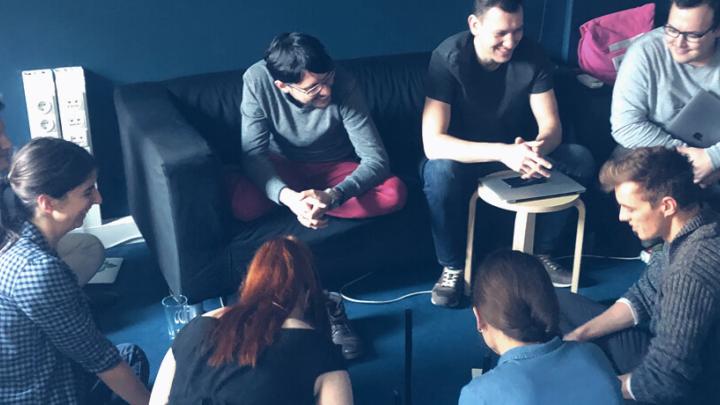
Six people joined the company this year. We integrated a new member into the team on six occasions, and in the first two cases, we did not offer proper support on how to get the ball rolling. "Adapt yourself to the circumstances, ask if you got stuck." - that's what I advised to the newcomer waiting for some orientation, and I noted with satisfaction that if she got by during the first three months, then our team would be pleased with a proactive member.
A half-year passed, and it came up as a joke of how good it would have been if the new colleagues had received more help at the time of their arrival. Then it became a less amusing topic in the office. We realized that we should be more conscious about how we deal with the integration of new team members. We decided that we would ask for help from Watson. So, six of us attended on a coaching day to take a look at our onboarding process with the help of psychodramatic methods.
I started the day with an excellent coffee and the most delicious poppy seed strudel, which made it easier for me to handle the shock caused by the realization of how important the concepts of "leader" and "team" are at multinational companies. I did not understand why there is so much emphasis on these terms. They made leaders stand up, and team members give them a round of applause. It was an alienating experience, and even the playback theatre we created afterward to reveal emotions did not ease my frustration.
At last, we sat down with our coach. He seemed to be good at his job. He was balancing quite well and kept us motivated but also managed to set and maintain the boundaries as well. He encouraged us to visualize our relationship with the company. We went forward on a step by step basis; every gesture, every position had its place and role. We formed statues, and the images are still sharp in my mind.
Later, in a second game, we visualized our onboarding process on a timeline from engagement till arrival. I was amazed at how detailed the view we can get about the integration. It became evident at which points we have to intervene earlier and in which cases we have to pay more attention. I had already realized before that all the working conditions have to be provided even before the first day. Although I had something in mind, what does it mean in reality, the emotional commitment had been missing to go ahead and make sure that the new member can get all the information needed to perform their job independently. It is hard to realize that something which seems to be an insignificant detail for me can have a massive impact on the new colleague.
We were standing there like living statues when the following sentence was formulated: "Hey, this is your computer installed, and he is Dezso, if you get stuck, please turn to him, he will help you with your onboarding." It is a straightforward statement; nothing was surprising in it, still, in that situation, it was a very stimulating experience how essential such triviality could be.
After the drama sessions, we reorganized the groups and shared our reflections of the day and the thoughts and plans we would bring with us. As the circle became wider and we get back to the milieu of big companies, I got confused again. Severe sentences and grave conclusions were flying around, and I kept thinking that it would be self-delusion to believe that a three-hour workshop can create a profound change in our or the company's life. It was not why we came. We set less ambitious goals: we just wanted to reconsider our onboarding process.
Undoubtedly the group sessions provided much more: the emotions we revealed and experienced made us more related to the feelings of newcomers and helped us to pay more attention to the details when the next three people join our team.
Now that we received a considerable impulse to focus more on our integration process, the question arises: how can we preserve this effort? How can we have the energy to maintain this focus in the next couple of years?
In a traditional organization, we could just simply create a role and make someone to fill this in. If someone is not doing well, we can point out the shortcomings. It can work too, but we intend to follow a different path. We deal with topics with tensions or where there is flow. In this particular case, our new colleagues are the ones who can provide incentives. Their experience is fresh; what was it like to search for connections, draw the concept map on the blank paper.
Share with your friends!


